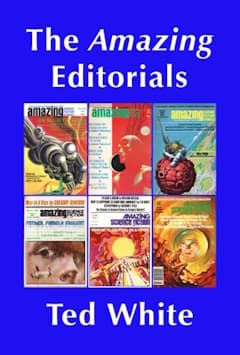
The Amazing Editorials by Ted White
(Ansible Editions, 2023)
Reviewed by Graham Andrews
Please bear with me for a few preliminary Down Memory Lane words, concerning Marshall’s newsagents in 1960s/1970s Belfast, Northern Ireland. It sold just about every American SF magazine then extant, including the otherwise unobtainable Amazing and Fantastic. Both these magazines had been in the doldrums for several years, and I generally gave them a miss. What attracted me back to reading them was the editorial policy of Ted White—and the editorials written by Ted White. BTW: I’m prone to reading the non-fiction contents of a magazine before getting round to reading the fiction.
Editorials in stf (White’s preferred contraction) magazines were nothing new by then, of course, with John W. Campbell of Astounding/Analog being the prime impersonally polemical example. In his Introduction (‘The Amazing Ted’), Mike Ashley avers that a magazine should have a distinctive personality: “That personality may in part be a product of the contributors but its chiefly created by the editor—of an editor who loves what they’re doing.” White followed the fan-friendly example of Raymond A. Palmer, who had also edited both Amazing and Fantastic, back in the mid-century day.
From White’s first editorial (May, 1969): “It is my conviction that the science fiction field needs a magazine in which the old and the new can exist side by side, each thriving from the proximity of the other. And that is what I intend for Amazing: Something of the old [dawn-age reprints by Edmond Hamilton and Murray Leinster, et al.] and the best of the new writers.” The latter included One Million Tomorrows (Bob Shaw: November, 1970–January, 1971) and The Second Trip (Robert Silverberg: July–September, 1971).
White contributed the occasional book review, thereby proving himself to be fully the equal of Damon Knight and ‘William Atheling, Jr.’ (James Blish). Speaking of Blish, he damned Black Easter without even the faintest praise (January, 1970): “At best, then, Black Easter is not a novel, but only an extended parable. At worst, it is a tract. In either case, it pleads its point through the straw-man manipulations of its author in a fashion I consider to be dishonest to its readers.” Having said that: “In sum, then, The Day After Judgment successfully salvages Black Easter, and, if considered with that book as one novel, removes my largest obstacle to Black Easter.” (September, 1971). These two novellas were indeed later combined to form the The Devil’s Day (Baen Books, 1990).
More importantly, White wrote “direct, first-person editorial statements” and made a conscious decision to inject personality into Amazing and Fantastic. His own personality, of course, and “yours as well, via a direct feedback process, your letters”: The Club House, in Amazing. When accused of adopting too “fannish” an editorial stance, White accepted that criticism, but only if it could be defined as an attitude of “joyful involvement” by which he “gained pleasure” from his work. His material ranged from Big Thinky Bits (e.g., Watergate and the 1970s energy crisis) to Wee Thinky Bits (e.g., informal con reports and “I’m not one to gossip, as you know, but…” squibs). ‘Diverse Topics’ (March 1976) is eclectically typical: a mini-book review (of Alternate Worlds: The Illustrated History of Science Fiction, by James Gunn); fan/professional critical magazines (Algol and Science Fiction Review); Lunacon and SF Expo 1976; NYC politics.
Ted White edited 50 issues of Amazing, including the celebration of its Golden Jubilee (1976). His last editorial was the aptly titled ‘Lost, Strayed, Or…’ (February 1979). The frayed shoestring budget finally snapped, but he had brought an ailing magazine back to no small measure of popular and critical health. White is one of the best editors never to be awarded a Hugo—so Retro Hugo voters, please copy. From the Afterword: “Taken together, it’s a lot to digest [but] don’t overlook the companion volume of Fantastic editorials and reviews. Double your fun.”
N.B. Ted White also edited The Best from Amazing Stories (Manor Books, 1973.)
Review from BSFA Review 22 - Download your copy here.
